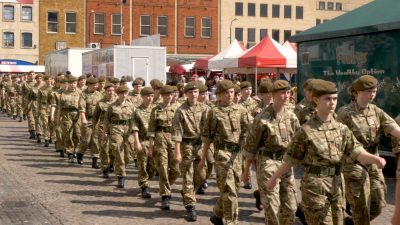The Ministry of Defence has no place in our schools
ForcesWatch comment
Cadet units can improve attendance and educational achievement, supporting children in ways that schools cannot, said an interim report on the social impact of cadet forces published this week by the University of Northampton.
Defence Secretary Michael Fallon praised the report while announcing 31 new cadet units in state schools.
The funding of the cadet expansion programme, part of nearly £90 million that has gone into military programmes in education since 2012, seems rather an anomaly.
In contrast, non-military services and facilities for young people have been decimated in recent years, and education is facing a funding crisis.
Teaching and support staff posts are being cut, along with Special Educational Needs (SEN) provision and spending on books and equipment. Funding for education of 16-19 year olds has been devastated.
Outside the classroom, the picture is equally bleak. Youth clubs have been so badly hit that they are closing up and down the country and may become once more reliant on Dickensian philanthro-capitalism.
Children’s mental health services have also faced cuts, with funding falling by nearly £50m between 2010 and 2015.
Michael Fallon’s plan to introduce cadet units into state schools isn’t a real solution to the UK’s education crisis https://t.co/Qd2RRwERjm
— Independent Voices (@IndyVoices) October 3, 2017
I’ve seen first-hand the impact of these cuts, having worked as a teaching assistant in a comprehensive school. My team supported pupils with physical needs and learning difficulties in and outside the classroom.
The department has now been cut to the bone. One Year Eight pupil with learning difficulties offered to run a cake sale to raise money for us.
I was a “mentor” to an 11-year-old boy — I’ll call him Connor — who struggled academically and behaviourally, due to emotional difficulties.
Many of his issues arose from home, where there was a history of abuse. Connor started the year well, and asked repeatedly if he could have counselling, which had helped him in primary school. But the school was unable to provide this.
As the year progressed, Connor got into fights and disengaged from learning. I pushed for him to be given extra support, but by the time occasional “anger management” sessions were offered to him, he had already started down a pathway he wouldn’t come back from easily. He was expelled the next year.
The University of Northampton report, and Fallon’s dream of cadet units blossoming up and down the country, herald the cadet forces as the solution to the struggles of children like Connor.
It is motivated by the militarisation agenda; to increase uncritical support for the military (and their operations) and boost recruitment. The report itself mixes child development aims with defence aims such as savings, recruitment and PR for the armed forces.
This is premised on the militarist narrative in which the military is the highest of institutions, a school for the nation which offers a solution to all of society’s problems. This narrative is disingenuous, flawed, and dangerous.
It is disingenuous because Ministry of Defence documents show that the advancement of military influence in education, including cadet expansion, is not motivated by the best interests of young people.
Rather, it is motivated by the militarisation agenda; to increase uncritical support for the military (and their operations) and boost recruitment.
The report itself mixes child development aims with defence aims such as savings, recruitment and PR for the armed forces.
It is flawed, because while the cadet forces offer benefits to many young people, so too would any well-funded youth programme with excellent resources.
It is dangerous, because while the report deems it praiseworthy that the cadet forces are a route to recruitment — while simultaneously lauding the benefits offered by cadets for socio-economically disadvantaged and emotionally troubled young people — in fact military service can be highly damaging to this demographic in particular.
As evidenced in a new report called The First Ambush? Effects of army training and employment, commissioned by Veterans for Peace UK, young people with experiences of childhood adversity, who exhibit violent behaviour at a young age, or have mental health problems, are not for the most part “rescued” by a military career.
They are likely to leave early and face unemployment due to a lack of transferable qualifications after leaving education to enlist. Their early difficulties leave them more susceptible to mental health problems triggered by training and in service.
Children like Connor don’t need a cadet force to try to mould them into controlled, obedient and patriotic young citizens. They need proper and sustained mental health support in a supportive learning environment with qualified professionals.
They need well-funded education. They need opportunities to feel comfortable and confident, to grow in empathy and self-efficacy. Such opportunities are not unique to or owned by military environments.
The primary aim of the Ministry of Defence is not to advance the wellbeing of young people. Its priorities may in fact sometimes clash with the best interests of the young people with whom it interacts.
This is evidenced by the much criticised practice of recruiting young people before they are adults, the culture of silencing and cover-up around abuse, and the “moral exploitation” of promoting often ethically perilous agendas to young people.
I asked Dr Brian Belton, an international authority on youth work, what he thought about the University of Northampton report.
Youth work is divided into two movements, he said; one which seeks to “harness and develop young people, primarily for the benefit of the maintenance of the state,” and one in which young people are seen to have “the capacity within themselves to be creative and auto-didactic in terms of learning about themselves and the world.”
Even if we are concerned purely with outcome, he argues that “military ethos” type projects like the cadet forces are not what we actually need today: “the modern world does not require conformity, it demands innovation.”
We should all be very concerned by the direction in which education and youth work is heading. A growing socio-economic chasm and calls to “fill the ranks” of the military from Britain’s schools do not bear much promise for a new generation equipped to thrive in the modern world and respond to the challenges it faces.
Instead of pushing militarist conformity, we should be investing in education, mental health facilities and youth work that supports young people to think critically, innovatively and ethically.
See more: cadets, military in schools/colleges, education
Like what you read?
> Sign up for our newsletter or blog notifications
> Support our work – from just £2 a month










